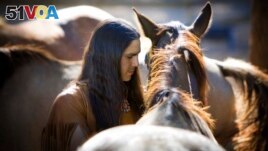07 April 2023
A new study suggests that horses were present in the American West by the early 1600s. That is earlier than most written histories have estimated.
The new finding came from examinations of horse bones gathered from museums across the central Great Plains and northern Rocky Mountain areas of the U.S.
The study's estimate supports spoken histories of several Native American groups. The groups say their communities kept horses of Spanish origin before Europeans physically arrived in their homelands.

In this photo provided by Sacred Way Sanctuary, He Stalks One spends time with a horse in Alabama in 2021. (Sacred Way Sanctuary via AP)
A study describing the findings recently appeared in the publication Science. More than 80 co-writers took part in the study, including archaeologists, geneticists and historians. The team also included scientists from the Lakota, Comanche and Pawnee Native American nations.
Past research suggests that the ancestors of modern horses first appeared in North America millions of years ago. That is before horses arrived on the central plains of Europe and Asia, where they were domesticated. But those early horse ancestors disappeared from North America about 6,000 years ago.
In the new study, scientists examined more than 20 sets of horse remains from sites in several U.S. states. They aimed to establish that horses were ridden and raised by Indigenous groups by the early 1600s.
William Taylor is an archaeologist at the University of Colorado at Boulder and was one of the writers of the study. He told The Associated Press (AP), "Almost every aspect of the human-horse relationship is manifest in the skeleton in some way."
The study suggests the horses were present in the American West and Southwest many years before the Pueblo Revolt of 1680. That revolt involved allied Indigenous groups pushing Spanish colonizers out of New Mexico.
The fleeing armies left behind many horses and other animals. The study says historical records incorrectly identified that moment as the entrance of the horse into the cultures of Indigenous groups in North America.
"Now we can wave goodbye to the Pueblo Revolt as an explanation for the spread of the horse into the American West," said Peter Mitchell. He is an archaeologist at Britain's Oxford University. He was not involved in the study.
Indigenous groups have long disputed this timeline. This is because spoken histories of many groups suggested they had seen horses before meeting Europeans.
Jimmy Arterberry is a co-writer of the study and a historian with the Comanche Native American nation in Medicine Park, Oklahoma. He told the AP that multiple spoken histories state that Indigenous groups first saw horses that had either run away from Spanish camps or been traded through tribal networks.
"We have always known and said that we came across horses before we came across the Spanish," Arterberry said.
Yvette Running Horse Collin is one of the writers of the study. She is an evolutionary geneticist at the Center for Anthropobiology and Genomics of Toulouse in France. She is also a member of the Oglala Lakota Nation. Collin said the findings show that the spoken histories and traditions of Indigenous peoples can be useful in understanding the past.
"Our cultures have been so misrepresented for so long," she said. "Too often history has been told around us, without us."
More than 70 years ago, archaeologists took artifacts from burials and ceremonial sites without asking Native peoples in the area. The study was started by Lakota researchers. Some consider it one step in repairing mistrust between Indigenous groups and archaeologists.
The study also suggests that, over time, the genetics of horses in North America went from being mainly of Spanish origin to a mixture of British and Spanish.
I'm Bryan Lynn.
The Associated Press reported this story. Bryan Lynn adapted the report for VOA Learning English.
__
Words in This Story
origin – n. where something begins or comes from
domesticate – v. to tame an animal to keep as a pet
aspect – n. one part of a situation, problem, subject etc.
manifest – v. to show a quality or condition
evolution – n. the theory that changes in plants and animals happen because of natural processes over long periods of time












